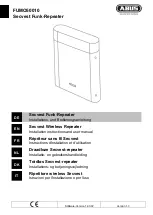
Manual Pretrip Inspection (Before Starting the Unit)
46
Keep the radiator clean and clear of debris by gently spraying
with water.
NOTE: Used Ethylene Glycol based coolant is a regulated
substance requiring proper disposal. Check for local disposal
regulations. Do not store in open containers. Keep away from
children and animals.
Battery:
Make sure the battery terminals are tight and free of
corrosion. Electrolyte should be at the Full mark.
Belts:
Make sure belts are in good condition and adjusted to
the proper tension. For more information about belt tension,
see the Specifications chapter.
Electrical:
Check the electrical connections to make sure they
are securely fastened. Wires and terminals should be free of
corrosion, cracks, and moisture.
Structural:
Visually inspect the unit for leaks, loose or
broken parts, and other damage.
Damper:
Make sure the damper in the evaporator air outlets
move freely, with no sticking or binding.
Coils:
Make sure the condenser and evaporator coils are clean
and free of debris.
Cargo Box:
Check the interior and exterior of the trailer for
damage. Any damage to the walls or insulation must be
repaired.
Defrost Drains:
Check the defrost drain hoses and fittings to
make sure they are open.
Doors:
Make sure that the doors and weather seals are in good
condition. The doors should latch securely and the weather
seals should fit tightly.
IMPORTANT: To prevent damage to the controller, always
push the controller access door firmly closed.
CAUTION: If air is suspected to be trapped in the
system, it must be bled out. If the engine runs with air
trapped in the block, the engine may be damaged.
Manual Pretrip Inspection (Before Starting the Unit)
46
Keep the radiator clean and clear of debris by gently spraying
with water.
NOTE: Used Ethylene Glycol based coolant is a regulated
substance requiring proper disposal. Check for local disposal
regulations. Do not store in open containers. Keep away from
children and animals.
Battery:
Make sure the battery terminals are tight and free of
corrosion. Electrolyte should be at the Full mark.
Belts:
Make sure belts are in good condition and adjusted to
the proper tension. For more information about belt tension,
see the Specifications chapter.
Electrical:
Check the electrical connections to make sure they
are securely fastened. Wires and terminals should be free of
corrosion, cracks, and moisture.
Structural:
Visually inspect the unit for leaks, loose or
broken parts, and other damage.
Damper:
Make sure the damper in the evaporator air outlets
move freely, with no sticking or binding.
Coils:
Make sure the condenser and evaporator coils are clean
and free of debris.
Cargo Box:
Check the interior and exterior of the trailer for
damage. Any damage to the walls or insulation must be
repaired.
Defrost Drains:
Check the defrost drain hoses and fittings to
make sure they are open.
Doors:
Make sure that the doors and weather seals are in good
condition. The doors should latch securely and the weather
seals should fit tightly.
IMPORTANT: To prevent damage to the controller, always
push the controller access door firmly closed.
CAUTION: If air is suspected to be trapped in the
system, it must be bled out. If the engine runs with air
trapped in the block, the engine may be damaged.
Summary of Contents for SB-200TG
Page 1: ...Operator s Manual SB 200TG Operator s Manual SB 200TG TK 53598 2 OP Rev 0 02 07...
Page 7: ...6 Table of Contents 6...
Page 11: ...10 Introduction 10...
Page 21: ...20 EPA Emission Control System Warranty Statement 20...
Page 43: ...42 TG VI Controller Description 42...
Page 45: ...44 Remote Status Light Optional 44...
Page 83: ...82 Alarm Codes 82...
Page 103: ...102 Warranty 102...
Page 117: ...116 Serial Number Locations 116...
















































